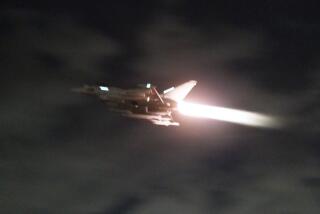U.S. Disavows Aide’s Iran Remark
- Share via
WASHINGTON — The White House delivered a sharp public rebuke to the State Department’s chief Middle East specialist Friday, disavowing his suggestion that the United States would respond militarily if Iran attacked U.S. Navy-protected Kuwaiti oil tankers.
White House spokesman Marlin Fitzwater, talking to reporters aboard President Reagan’s Air Force One jetliner, said that Richard W. Murphy, assistant secretary of state for Near Eastern and South Asian affairs, exceeded his authority when he said an Iranian attack on U.S. shipping in the Persian Gulf would add “a new dimension” to Iran’s war with Iraq.
“We disagree with Murphy. . . . He was not authorized to say that,” Fitzwater said.
Murphy, at a press conference Thursday, said the plan to register 11 Kuwaiti tankers as American-flag vessels would protect American economic, political and strategic interests, although it would involve some risk of armed clashes between the United States and Iran.
Fitzwater insisted that the tanker plan “does not represent an increase in hostilities in any way.”
Consultation Vowed
The press spokesman also said the Administration would consult fully with Congress on “every aspect of the re-flagging” of Kuwaiti ships. He was responding to a demand by the Senate that the Administration inform Congress, before the start of protection of Kuwaiti vessels, how U.S. Navy ships would defend themselves in the gulf.
The Senate, by a 91-5 vote, added the provision to a supplemental appropriation bill Thursday. The measure was supported by Majority Leader Robert C. Byrd (D-W.Va.) and Minority Leader Bob Dole (R-Kan.).
At his press conference, Murphy insisted that the United States “has no interest in provoking Iran. . . . This is not in any stretch of the imagination a provocative stand vis-a-vis Iran.”
He said it was unlikely that Iran would attack tankers flying the American flag or the warships deployed to protect them, but he conceded that “we cannot be totally sure of anything where Iran is concerned.”
“Attacks (by Iran) on armed military vessels would add a new dimension to the war,” Murphy said. “Iran has not won that war (with Iraq), and we think it would be reluctant to initiate actions that could provoke a second.”
When asked to explain his reference to a second war, Murphy said, “I meant a second one with us.”
However, when a reporter asked if he was suggesting that an Iranian attack on an American ship would mean that the United States would go to war with Iran, Murphy replied: “I’m not suggesting any such thing. . . . I said I didn’t think they would want to start a war. I think that’s a reasonable assumption.”
Warning Intended
Murphy clearly intended to warn Tehran that it would be risky to attack U.S. ships. There is no way to know whether his comments frightened Iran, but it seems certain that they frightened others in Washington.
Regarding the Senate demand for information on the Navy’s intentions in the gulf, Sen. Dole said, “We should make no more commitments like the Kuwaiti tanker arrangement until we are absolutely certain it is in our long-term interests. . . .” Dole, usually a strong supporter of the Administration, added, “I hope and expect the President will consult with us fully.”
Sen. Byrd said, “The issue is how to avoid a repetition of the Stark tragedy and still pursue American interests in the Persian Gulf.”
Presidential spokesman Fitzwater said the White House would reserve “final judgment” on the Senate action. But he added, “As a general matter, we think our consultations with Congress will probably meet the spirit, certainly, if not the letter of the requirements of the (amendment).”
U.S. officials said the United States and Kuwait have already agreed in principle that 11 of Kuwait’s fleet of 22 supertankers will be re-registered as American ships. They will carry an American captain, but the rest of the crew will not be Americans.
Although Coast Guard inspections and other technical matters have not been completed, State Department spokesman Charles Redman said the first Kuwaiti tanker was expected to be at sea under the American flag in about two weeks.
Investigation Team Leaves
Redman also said a U.S. team, consisting mostly of Pentagon officials, left Washington on Friday to participate in a joint investigation with Iraq. He said the delegation would stop first in Bahrain, where the crippled frigate Stark was taken after it was hit in an Iraqi missile attack Sunday. The investigators are expected to arrive in Baghdad on Monday.
He said the U.S. investigators “will seek access to every Iraqi military officer who had anything to do with the attack.”
More to Read
Sign up for Essential California
The most important California stories and recommendations in your inbox every morning.
You may occasionally receive promotional content from the Los Angeles Times.













